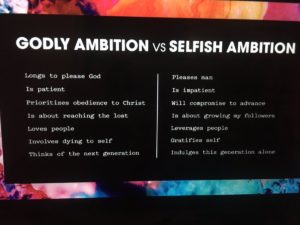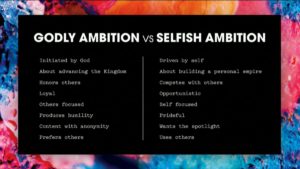

Tonight Passion 2017 began from the Georgia Dome located in Atlanta. It you are unfamiliar with Passion, it is the 20th anniversary of a gathering of over 55,000 18-25 year olds with the sole purpose of making the name of Jesus famous. Over 1,600 campuses and 90 countries were represented. On a special note, this will be the final event at The Dome before it is tore down.
The three-day event began with words from Passion’s founder Louie Giglio and Christine Caine. Her challenging session on faith and endurance from Hebrews 10 and 11 inspired all in attendance. Included are images of her differentiating between Godly Ambition and Selfish Ambition.
The following are 49 Leadership Quotes And Lessons From Louie Giglio And Christine Caine – Passion 2017:
Louie Giglio
- “I hope all your anxiety and fear is washed away tonight. I hope you find family tonight.”
- “There are tens of thousands of people in here and God knows every one of your names.”
- “There’s something more important than everything else in world. The person of Jesus Christ. There is nothing close to Him.”
- “At 84 you can still be loving God. Still running in your lane. Still making a difference for Christ.” – Louie on Dr. Charles Stanley
- “In 1997 you weren’t even born yet.” – to people 20 years or younger when Passion began in Austin, TX.
- “The greatest days of the church are ahead of us, not behind us.”
- “The first 20 years have just been a foundation of what is yet to come.”
- “In 1997 this wasn’t here. It was there.”
- “Here always becomes there. We’ve got to stop living for there and start living for here.”
- “The followers of Jesus Christ do not need to grow weary or faint hearted.”
- “You will have need of endurance. Not of faith or talent but endurance.”
- “We’re going to need faith + patience, faith + endurance.”
- “You do not need to freak out but you will need endurance.”
- “We will have the victory but we will need endurance.”
- “Faith doesn’t always mean you’re not going to go through pain and suffering.”
- “This is our time. This is our place. God has given us the baton to reach our generation.”
- “He is still on the throne and the government is on His shoulders.”
- “We are running from victory, not for victory. Jesus Christ died and rose again. We have read the end of the Book and just in case you’re wondering, we won.”
- “No one else will offer you forgiveness from the past and hope for the future.”
- “I’ve built up some strength because I’ve come up against pressure.”
- “We’ve developed a society that doesn’t have patience, that doesn’t celebrate waiting.”
- “Don’t build resistance in the path of least resistance.”
- “Because of Jesus we can run our race with hope.”
- “We won’t live the life we want to live if we don’t learn to endure.”
- “How did we get here after 20 years? Louie and Shelley just didn’t stop.”
- “You don’t get endurance on an app. There is an app to help you build endurance but not an app for endurance.”
- “The greatest thing you can do is lay your weights and sins at the foot of Jesus Christ.”
- “If God can use someone like me…there is not one person in this room God cannot turn your mess around for your good and His glory.”
- “Obedience to the Word of God is not legalism.”
- “Doing what God tells me to do is for our good.”
- “You’ve only got here and you’ve only got now.”
- “We’re so busy scrolling through everyone else’s life we’re going to miss ours.”
- “Don’t despise where God has you now.”
- “The goal of Christianity is not fame, fortune or followers but faithfulness where God has placed me.”
- “If you are not faithful here you will not be fruitful there.”
- “Motives are very important to God.”
- “I obsess about faithfulness today.”
- “Why would I limit God to what I could think?”
- “The further you go in life the more important one degree is. Where you begin your life is important.”
- “Set the compass of your heart to be right.”
- “The path of endurance checks your motives.”
- “Jesus didn’t even do what He wanted to do. He did what His Father wanted Him to do.”
- “if we are Christ-followers in this room we are not our own. We were bought with a price. We belong to Jesus.”
- “Godly ambition lives for the glory of God alone.”
- “I buried my mom three months ago.”
- “Jesus have I done everything you wanted me to do?”
- “He is the one who endured to the end. We magnify Him.”
- “Jesus is the One who endured.”
- “Because Jesus Christ endured let us therefore endure for our generation. The same Spirit that raised Jesus Christ from the dead lives inside you and me.”

Click HERE or on the image to the left and as a free gift for subscribing to this site, you can receive my new Ebook 1269 Leadership Quotes: Timeless Truths From 2016’s Top Christian Leadership Conferences. Featured are the Johnny Hunt Mens Conference, ReThink Leadership, Orange and Leadercast Conferences among others. If applied, these insights will make you an exponentially better leader. Enjoy!!!
 First, what is mindfulness? Mindfulness is a spiritual discipline
akin to biblical meditation. It’s setting aside daily time to be still
before God, to be in His presence in the present moment. It’s not
emptying our minds, but filling our minds with thoughts of Him and His
Word. And it’s not some weird new age practice. It’s a science based
practice that helps us disengage from automatic and unhealthy thoughts,
feelings, memories and reactions to simply be in God’s presence. It’s
both a devotional practice and a way to live each moment.
First, what is mindfulness? Mindfulness is a spiritual discipline
akin to biblical meditation. It’s setting aside daily time to be still
before God, to be in His presence in the present moment. It’s not
emptying our minds, but filling our minds with thoughts of Him and His
Word. And it’s not some weird new age practice. It’s a science based
practice that helps us disengage from automatic and unhealthy thoughts,
feelings, memories and reactions to simply be in God’s presence. It’s
both a devotional practice and a way to live each moment.
 Murray Bowen, the father of family systems, coined the phrase “
Murray Bowen, the father of family systems, coined the phrase “
 When she told me that he had left without fixing the toilets and then
charged us, my emotions took over. I was ticked off. Livid better
describes how I felt. I couldn’t even think straight. My wife
immediately sensed the anger in my voice and assured me that she’d call
him back and have him return to complete the repairs.
When she told me that he had left without fixing the toilets and then
charged us, my emotions took over. I was ticked off. Livid better
describes how I felt. I couldn’t even think straight. My wife
immediately sensed the anger in my voice and assured me that she’d call
him back and have him return to complete the repairs. ALBUQUERQUE, NEW MEXICO (ANS – January 12, 2017)
-- “Not all readers are leaders, but all leaders are readers.” This
quote by Harry Truman has been used by many to advocate the importance
of reading to leadership -- in any given field. Pastor and author,
Warren Wiersbe, summarized it as, “readers are leaders” [1]. But the
question is -- is it true? Are leaders readers? Whether or not we can
validate that great leaders in the past were voracious readers (think of
Queen Elizabeth of England or King Charlemagne of Europe), we do know
that many modern leaders such as Abraham Lincoln, Winston Churchill,
Teddy Roosevelt, and Martin Luther King, Jr. were readers. And though
I’m sure there are some fine leaders who aren’t consistent readers, we
do know that reading provides many important benefits for the brain.
ALBUQUERQUE, NEW MEXICO (ANS – January 12, 2017)
-- “Not all readers are leaders, but all leaders are readers.” This
quote by Harry Truman has been used by many to advocate the importance
of reading to leadership -- in any given field. Pastor and author,
Warren Wiersbe, summarized it as, “readers are leaders” [1]. But the
question is -- is it true? Are leaders readers? Whether or not we can
validate that great leaders in the past were voracious readers (think of
Queen Elizabeth of England or King Charlemagne of Europe), we do know
that many modern leaders such as Abraham Lincoln, Winston Churchill,
Teddy Roosevelt, and Martin Luther King, Jr. were readers. And though
I’m sure there are some fine leaders who aren’t consistent readers, we
do know that reading provides many important benefits for the brain. According to Entrepreneur,
qualities such as focus, confidence, transparency, integrity,
inspiration, passion, patience, innovation, open-mindedness, and
authenticity help define a great leader [4]. And Forbes lists honesty,
delegating, communication, confidence, attitude, creativity, and
commitment as some of the characteristics [5]. And in an article by Anne
Latham for Forbes, she narrows the qualities down to three: respect, self-awareness, and clarity [6].
According to Entrepreneur,
qualities such as focus, confidence, transparency, integrity,
inspiration, passion, patience, innovation, open-mindedness, and
authenticity help define a great leader [4]. And Forbes lists honesty,
delegating, communication, confidence, attitude, creativity, and
commitment as some of the characteristics [5]. And in an article by Anne
Latham for Forbes, she narrows the qualities down to three: respect, self-awareness, and clarity [6]. Dovey
continues, “Other studies published in 2006 and 2009 showed something
similar -- that people who read a lot of fiction tend to be better at
empathizing with others (even after the researchers had accounted for
the potential bias that people with greater empathetic tendencies may
prefer to read novels). And, in 2013, an influential study published in Science
found that reading literary fiction (rather than popular fiction or
literary nonfiction) improved participants’ results on tests that
measured social perception and empathy, which are crucial to “theory of
mind”: the ability to guess with accuracy what another human being might
be thinking or feeling, a skill humans only start to develop around the
age of four.”
Dovey
continues, “Other studies published in 2006 and 2009 showed something
similar -- that people who read a lot of fiction tend to be better at
empathizing with others (even after the researchers had accounted for
the potential bias that people with greater empathetic tendencies may
prefer to read novels). And, in 2013, an influential study published in Science
found that reading literary fiction (rather than popular fiction or
literary nonfiction) improved participants’ results on tests that
measured social perception and empathy, which are crucial to “theory of
mind”: the ability to guess with accuracy what another human being might
be thinking or feeling, a skill humans only start to develop around the
age of four.” About
the writer: Brian Nixon is a writer, musician, artist, and minister.
He's a graduate of California State University, Stanislaus (BA), Veritas
Evangelical Seminary (MA), and is a Fellow at Oxford Graduate School
(D.Phil.). To learn more, click here:
About
the writer: Brian Nixon is a writer, musician, artist, and minister.
He's a graduate of California State University, Stanislaus (BA), Veritas
Evangelical Seminary (MA), and is a Fellow at Oxford Graduate School
(D.Phil.). To learn more, click here: 